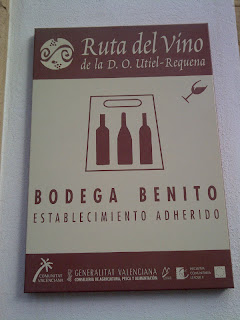On a recent trip to Valencia we took the opportunity of checking out the local wine. Reds tend to be from Bobal, a grape that in the 1980s held 11th place in the list of the world's most planted varieties. At that time there were over 90,000 hectares planted (mostly in Spain - mostly in Valencia, Utiel-Requena and Manchuela. Now the figure has fallen to 85,000 while the reputation of the grape itself has risen.
This re-valuation of Bobal on the Grape bourse is due to the fact that it is different from other Spanish varieties in that it makes light wines of good acidity and lower alcohol.
Utiel-Requena had always fascinated us; the names sound like something out of 'Il trovatore' (which actually takes place in Aragon much further to the north). Valencia itself is Spain's 3rd city but somehow a bit off the beaten track. For that reason there have been unbelieveable efforts in the last decade or so to put it on the map, involving public spending on an epic scale. Just in time for the crash, a magnificent Science Park, Opera House, airport terminal
and Concert Hall were built by architects including Santiago Calatrava. These buildings are now rather underused but they will still be there for the turn-around in the Spanish economy which is bound to come later if not sooner.
These public works also included impressive Autopistas and the incredible high-speed train network but despite all this spending, our visit to Requena (100km from Valencia) reminded us of the old Spain in both the good and less-good senses.
Just an hour from that fantastic Opera House, we saw street urchins rifling rubbish bins in Requena. Perhaps they has thrown out a school textbook by mistake and were only trying to retrieve it but somehow we doubt it. Requena is small. Compare their theatre!
But Requena is all about Bobal. The earth all around is a lovely orange pink and the plants are pruned low for bush Vines it seems as we didn't see too many trelisses or wires in the vineyards.
Bobal is as we heard, on the up and we certainly applaud the kind of diversity which results in lighter wines.
We arrived in Requena in mid-afternoon when everything was still closed but we had a nice walk through windswept streets
noting the hansome building in the centre of town, the Estacion de Viticultura y Enologia, the Calle Subida a Bodegas, the Ruta del Vino, even a winery down a side street complete with stainless steel tanks visible through glass windows
and last but not least the Bodega Benito where we hoped to get a free tutorial on the best wines from Bobal and maybe buy a bottle or two and if lucky, something else local made from a varriety we had never heard of: perhaps a Moravia Agria in purezza.
While waiting for the Siesta to come to an end, we popped in to what looked like a worker's cafe and had a glass of Bobal with some tortilla.
This eclipsed memories of Bobals past. Buoyed by optimism, we took up position outside Bodegas Benito ready for them to re-open at 17.00. the advertised hour came and went so at 17.30 we made our way back to Valencia, still with no sign of Benito's re-opening.
Back home we called Bodega Benito and discovered that if we wanted anything other than Bobal or the familiar repertoire of other Spanish wines, we would have to go to the actual place of production, i.e. for Moravia Agria we would have to go another hour down the road to Manchuela. How's that for Campanalismo?
As we saw at the Real Wine Fair in London in March, there is diversity enough in Spain. It just needs people to bring it to our attention. The way things are going, we think this is inevitable - later or sooner.
Thursday, 16 May 2013
Subscribe to:
Post Comments (Atom)














1 comment:
Interesting post. I'm a Canadian-British artist and filmmaker living near Utiel. In 2008, I edited my first documentary on wine which I am currently re-editing to reflect a number of changes https://vimeo.com/101941669
We'll be screening it in London on Sept 15 with a tasting of top quality Bobal wines. Please get in touch if you're interested.
Post a Comment